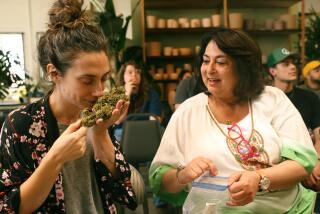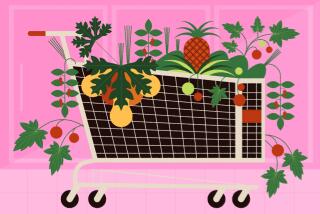Poet Offers Gardening Advice, With an English Accent
A GARDEN FROM A
HUNDRED PACKETS OF SEED
By James Fenton
Farrar, Straus & Giroux
136 pages, $18
*
Considering the fact that James Fenton is one of England’s better-known contemporary poets, having held the coveted position of professor of poetry at Oxford from 1994 to 1999, one might perhaps have imagined that a slim volume bearing his name titled “A Garden From a Hundred Packets of Seed” would be a collection of his latest verse. In fact, it’s not. This book is literally what it says it is: advice about growing a garden from a hundred packets of seeds.
Not that this should come as a total surprise to readers familiar with Fenton’s many interests, which include not only poetry and criticism, but travel, theater, political journalism (he covered the rise of Pol Pot and the fall of Saigon as a freelance correspondent in Cambodia and Vietnam) and, yes, gardening. Here, as elsewhere, Fenton wants to offer a different way of looking at things. Most people, he believes, think of a garden as something to be designed: a miniature landscape harmoniously combining features such as trees, shrubs, hedges, borders, pathways, perhaps even a fountain or pool.
All well and good, but Fenton has a different approach to offer: Forget landscaping and just concentrate on what you want to grow.
Fenton points to the example of allotment gardening in towns all over Britain, where a person can rent a plot in a space set aside for communal horticulture. Allotment gardeners generally plant their favorite vegetables, herbs, fruits or flowers to enjoy each season, with no thought of creating a traditional “garden.” Fenton would like to redefine “garden” to encompass anything from Versailles to a box of morning glories on a fire escape or some Virginia stock in an old crab shell.
It’s not necessary to have a lot of land, spend a lot of money or worry about the overall design and structure to enjoy the pleasures of gardening. Forget about trees, bushes and plants, focus on seeds and flowers. Don’t worry about creating something permanent that will outlast the changing seasons, just sow whatever you’d like to see in the next few months.
Even if you are planning a more permanent garden on a substantial plot of land, it might be wise to start with annuals, suggests Fenton. Besides, for more and more people, the traditional garden is no longer a real option anyway: “[N]ot every would-be gardener has the prospect of owning or occupying the same plot of ground for a large number of years,” he notes.
“One moves on. One moves up in the world. One moves down in the world. One comes home and finds the locks changed and one’s luggage on the street.” Fenton proceeds to discuss some of his favorite flowers and why he likes them. He’s a sucker for colors: the intense blues of delphiniums, cornflowers, borage, gentian, the bright orange of poppies, the vivid red of a “Pheasant’s Eye” ranunculus. He also likes herbs that can be used in omelets or salads: chives, chervil, parsley. He loves annuals that behave like perennials, self-seeders, “flowers that hop around,” spreading themselves unpredictably all over the garden.
Brisk, lively, witty, occasionally a bit arch, Fenton’s prose style brightly conveys his knowledge and enthusiasm. Of a flower called Venus’ Navelwort he writes: “Gray-leaved and with spikes of white flowers, this twelve-inch annual brings with it thoughts of broderie anglaise, white needlework on white, the underwear of the high-minded.” Two caveats: For the countless flower-lovers who delight in the many and wonderful scents of flowers such as jasmine, rose, gardenia, lilac, violet, sweet pea or lily of the valley, this book comes up short. “[S]cent is not my strong point,” admits Fenton rather dismissively. And, although Fenton provides a great deal of specific advice on what, where and when to plant, all of it is geared to readers living in England.
On the whole, however, Fenton’s flexible, pragmatic approach is certainly one to be welcomed because it opens up the possibility of gardening to many who might not have thought they had the resources for it. Although filled with ideas that any gardener might find helpful, his book is aimed at those who must make do with less, which is to say, the average person living in our pared-down age, when a cramped condo with a tiny balcony costs what a handsome house on half an acre of land once did. Indeed, from this perspective, Fenton’s idea of a garden can be seen as a reflection of what’s wrong with modern life in general: the myriad conditions that prevent people from putting down roots; the necessity--or sometimes the preference--for quick gratification rather than long-term stability; the inability to develop a sense of attachment to any one place. Or, to quote Fenton, “One moves down in the world.”


